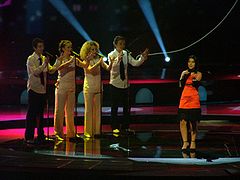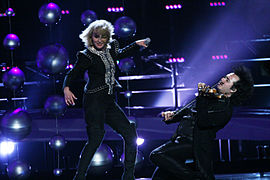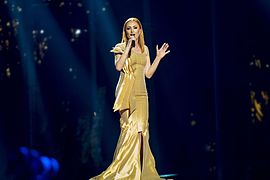Albania at the Eurovision Song Contest
This article deals with the history of Albania as a participant in the Eurovision Song Contest .
Regularity of participation and successes in competition
Albania entered the competition for the first time in 2004 and every year since then. When they first took part, Albania came in a good seventh place - a result that was not to be achieved for a long time: Anjeza Shahini succeeded in the semi-finals and was right at the front in the final. In the following years the country was less successful and had to go to the semi-finals in 2006 after a bad placement in the previous year, in which it got stuck like the year after. In 2008 Albania made it into the final in the second semifinals with only three points ahead of Macedonia in ninth place, where, however, like in 2005, it only finished 16th. In 2009 Kejsi Tola came 17th after successfully qualifying in the final . Juliana Pasha again took 16th place the following year . Aurela Gaçe , however, did not qualify for the final in 2011. In 2012, Rona Nishliu made it to the finals again in second place, where she achieved fifth place, the best result in the country to date. In 2013, however, there were only 31 points in the semi-finals with Identitet and 15th place out of 17 participants. In 2014, Hersi only reached the penultimate place in the semifinals and thus the worst result so far. In 2015, however, the country reached the final for the first time in three years. There they landed in 17th place. In 2016 and 2017, however, the Albanian entries were again clearly eliminated in the semi-finals. Albania only reached the final again in 2018. After a surprising qualification for the final, Eugent Bushpepa achieved 11th place in the final, the best placement in the country since 2012. With 184 points, he also got a new high score for the country. In 2019, the Albanian contribution reached the final again, finishing in 17th place.
In total, three of the 16 contributions ended up in the left half of the table. Overall, Albania was eliminated seven times in the semifinals, but never reached the last place. Nevertheless, the country has only been able to place in the top five once. Thus Albania is one of the less successful countries in competition.
List of posts
Color legend: - 1st place. - 2nd place. - 3rd place. - Equal points with last place. - Eliminated in the semifinals / in the qualification / in the Eastern European preliminary decision. - no participation / not qualified. - Cancellation of the Eurovision Song Contest.
| year | Interpreter | Title Music (M) and Text (T) |
language | translation | final | Semi-final / qualification |
National preliminary decision |
||
|---|---|---|---|---|---|---|---|---|---|
| space | Points | space | Points | ||||||
| 2004 | Anjeza Shahini |
The Image of You M: Edmond Zhulali; T: Agim Doçi |
English | Your image | 7/24 | 106 | 4/22 | 167 | Festivali i Këngës 2003 |
| 2005 | Ledina Çelo |
Tomorrow I Go M: Adrian Hila; T: Pandi Laço, Sidorela Risto |
English | tomorrow I go | 16/24 | 53 | Qualified directly for the final | Festivali i Këngës 2004 | |
| 2006 | Luiz Ejlli |
Zjarr e ftohtë M: Klodian Qafoku; T: Floran Kondi |
Albanian | The cold fire | Eliminated | 14/23 | 58 | Festivali i Këngës 2005 | |
| 2007 | Aida & Frederik Ndoci |
Hear My Plea M: Adrian Hila; T: Pandi Laço |
English, Albanian | Answer my request | Eliminated | 17/28 | 49 | Festivali i Këngës 2006 | |
| 2008 | Olta Boka |
Zemrën e lamë peng M: Adrian Hila; T: Pandi Laço |
Albanian | We gambled away the heart | 16/25 | 55 | 9/19 | 67 | Festivali i Këngës 2007 |
| 2009 | Kejsi Tola |
Carry Me in Your Dreams M: Edmond Zhulali; T: Agim Doçi |
English | Carry me in your dreams | 17/25 | 48 | 7/19 | 73 | Festivali i Këngës 2008 |
| 2010 | Juliana Pasha |
It's All About You M: Ardit Gjebrea; T: Ardit Gjebrea, Pirro Çako |
English | It's all about you | 16/25 | 62 | 6/17 | 76 | Festivali i Këngës 2009 |
| 2011 | Aurela Gaçe |
Feel the Passion M: Shpëtim Saraçi; T: Sokol Marsi |
English, Albanian | Feel the passion | Eliminated | 14/19 | 47 | Festivali i Këngës 2010 | |
| 2012 | Rona Nishliu |
Suus 1 M: Florent Boshnjaku; T: Rona Nishliu |
Albanian with a Latin title |
Personally | 5/26 | 146 | 2/18 | 146 | Festivali i Këngës 2011 |
| 2013 | Adrian Lulgjuraj & Bledar Sejko |
Identity M: Bledar Sejko; T: Eda Sejko |
Albanian | identity | Eliminated | 15/17 | 31 | Festivali i Këngës 2012 | |
| 2014 | Hersi Matmuja |
One Night's Anger M: Gentian Lao; T: Jorgo Papingji |
English | One night's wrath | Eliminated | 15/16 | 22nd | Festivali i Këngës 2013 | |
| 2015 | Elhaida Dani |
I'm Alive M: Arber Elshani, Kristijan Lekaj (Zzap'n'Chriss); T: Sokol Marsi |
English | I'm alive | 17/27 | 34 | 10/16 | 62 | Festivali i Këngës 2014 |
| 2016 | Eneda Tarifa |
Fairytale M / T: Olsa Toqi |
English | fairy tale | Eliminated | 16/18 | 45 | Festivali i Këngës 2015 | |
| 2017 | Lindita Halimi |
World M: Klodian Qafoku; T: Lindita, Big Basta |
English | world | Eliminated | 14/18 | 76 | Festivali i Këngës 2016 | |
| 2018 | Eugent Bushpepa |
Mall M / T: Eugent Bushpepa |
Albanian | nostalgia | 11/26 | 184 | 8/19 | 162 | Festivali i Këngës 2017 |
| 2019 | Jonida Maliqi |
Ktheju tokës M / T: Eriona Rushiti |
Albanian | Return to your country | 17/26 | 90 | 9/18 | 96 | Festivali i Këngës 2018 |
|
|
Arilena Macaw |
Fall from the Sky M: Darko Dimitrov, Lazar Cvetkoski; T: Michael Blue, Robert Stevenson, Sam Schummer |
English | Falling from the sky |
Cancellation due to the COVID-19 pandemic by the EBU |
Festivali i Këngës 2019 | |||
National preliminary decisions

The Albanian representatives have always been elected within the framework of the Festivali i Këngës, a music competition held since 1962 by the national television broadcaster Radio Televizioni Shqiptar ; the winner should also win the ticket to the Eurovision Song Contest. In 2004 and 2006, Anjeza Shahini and Luiz Ejlli each received a direct nomination for the festival as the winners of the Albanian pop idol format of those years. The preliminary decision has always been held on three days in December of the previous year for the respective song contest. Before the grand finals, there were two semi-finals, the total number of participants fluctuated over the years between 28 (2003), 32 (2004), 34 (2005), 31 (2006), 29 (2007) and 20 (2008). The jury usually voted.
In 2007, the result of the Albanian preliminary decision was highly controversial: The second-placed duo Flaka Krelani and Doruntina Disha had received the highest or second-highest rating from five of the seven jury members, while the remaining two members received no points at all, so with Zemrën e lamë peng der Won third contribution in five years, written by Adrian Hila and Pandi Laço. The entry's victory was also hotly debated in the Albanian press. The singer Blero had previously withdrawn his contribution on short notice on the grounds that the vote had been manipulated and the winner had already been determined.
The 52nd Festivali i Këngës, which selected the participant for the Eurovision Song Contest 2014 in Copenhagen , was the first since Albania's debut in 2004, in which all semi-finalists also competed in the final. There were only 16 candidates in total at the festival and the semifinals were irrelevant for the result. For the 53rd Festivali i Këngës, which took place from December 26th to 28th, 2014, the original mode was reintroduced, with eight or nine entries from each semi-final with 13 participants qualifying for the final. This system was also retained in the following years.
Languages of the contributions and new entries
Since at the Festivali i Këngës all titles have to be presented in Albanian, all contributions were in the original version in the national language. In 2004, 2005, 2009, 2010, 2014, 2015, 2016 and 2020, English versions were recorded for the competition as well as in 2007 and 2011 when the contribution Hear My Plea in Helsinki and the contribution Feel the Passion in Düsseldorf were sung in English and in Albanian were. In 2006, 2008, 2012, 2013, 2018 and 2019 the contributions were presented entirely in Albanian. In addition, all contributions were rearranged after the preliminary decision, among other things because they exceeded the maximum permitted duration of three minutes.
In 2015, for the first time, the winning song of the Festivali i Këngës was not used as an Albanian song at the ESC because the composer did not consider it suitable.
Scoring
The following countries received the most points from or awarded the most points to Albania (as of 2019):
|
|
|
|
||||||||||||||||||||||||||||||||||||||||||||||||||||||||||||||||||||||||||||||||||||
Award of the highest rating
Since 2004, Albania has awarded the highest number of points in the final to seven different countries, six of them to Greece. In the semifinals, Albania awarded the maximum number of points to eight different countries, seven of which went to North Macedonia.
|
|
||||||||||||||||||||||||||||||||||||||||||||||||||||||||||||||||||||||||||||||||||||||||||||||||||||||||||||||||||||||||
various
- Albania planned to take part in the competition as early as 2003 , but the European Broadcasting Union only allowed one new participating country - Ukraine - after a rule change . The winner of the Festivali i Këngës, Mira Konçi with the title Brenda vetes më merr, was intended to represent Albania .
- So far, Albania has received the most points on average from North Macedonia - 11.3 out of a possible 12. Albania awarded the most points to Greece - an average of 10.8.
- Albania very often placed between 16th and 18th place in the final (three times 16th, twice 17th and once 18th). In the semi-finals, on the other hand, the country landed in 14th or 15th place more often (three times 14th and twice 15th place).
- Ledina Çelo was the presenter of the Festivali i Këngës in 2004, a year before she won the preliminary round.
- In 2005 with Ledina Çelo, in 2007 with Aida and Frederik Ndoci, and in 2008 with Olta Boka, songs composed by Adrian Hila and written by Pandi Laço won the Albanian preliminary round. With two winning compositions (2004 and 2009) Edmond Zhulali and Agim Doçi are just behind.
- Since Albania selects and presents the entry for the Eurovision Song Contest in December of the previous year, the country is often the first of all participants, for example in 2004 , 2005 , 2006 , 2009 and 2016 . In 2007 , 2008 , 2010 and 2011 Albania was the second country whose contribution was presented to the public, whereas in 2008 the Andorran contribution had been previously chosen but only partially presented. In 2010 the Dutch contribution was only published in a demo version.
- In 2012 Albania did not broadcast the semi-finals live on television with Rona Nishliu, as May 22 was declared a national day of mourning after a serious bus accident. Only the votes of the jury were counted for the award of points.
Impressions
Web links
- The texts for all Albanian contributions up to and including 2013 (with pictures of the participants)
Individual evidence
- ↑ esctoday.com
- ↑ geocities.ws
- ↑ geocities.ws
- ↑ geocities.ws
- ↑ geocities.ws
- ↑ geocities.ws
- ^ Festivali i 47th i Kenges ne RTSH. Archived from the original on August 13, 2010 ; Retrieved December 2, 2008 .
- ↑ esctoday.com
- ↑ esctoday.com
- ↑ esctoday.com
- ↑ esctoday.com
- ↑ diggiloo.net
- ↑ Albania: Elhaida Dani Will Not Sing “Diell” At Eurovision . wiwibloggs.com, February 24, 2015
- ↑ geocities.ws
- ^ Albania to broadcast tonight's semi-final deferred. May 22, 2012, accessed May 25, 2012 .















